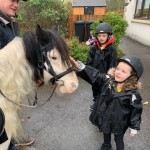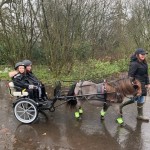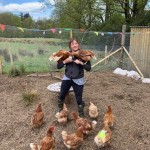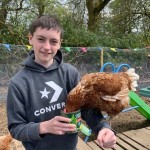Henry Hepburn visited our Forest View campus in Lochwinnoch last year where he discovered a newfound appreciation for the ability of animals and pets to keep children calm. At Forest View, children have the opportunity to interact with dogs, tortoises and ponies, which help our young people build relationships and control their emotions. Read Henry’s full article for TES Scotland.
About Our Forest View Campus
The children’s residential houses and adjoining therapeutic primary school at Forest View in Lochwinnoch, provide a safe, welcoming place for children who may have experienced trauma from a young age. The entire Forest View campus was designed to be trauma-informed from the very beginning. Part of the approach involved making animals a crucial and permanent feature of the campus due to the profound impact they can have on vulnerable children.
At the Core of Forest View
The in-depth article for TES Scotland, which was written by Henry Hepburn, explains the crucial advantages quality time with pets has on our young children, along with a full description about our therapeutic school, which follows the Curriculum for Excellence. The feature confirms that forming relationships is at the very core of Forest View – relationships between staff and the importance of working together effectively as well as with the children and the bonds children form with animals.
Why Animals Are A Permanent Feature at Forest View
Animals can play a number of key roles in the learning and development of our young children.
Animals Are Non-judgemental
Animals live in the present and are non-judgmental, they do not carry baggage over from a previous day. Children find that animals treat them well consistently.
Animals Encourage Empathy and Reduce Restlessness
Children may settle more easily when animals are in the room as the children realise the impact loud noises can have on the animals. Children agree to “use their quiet voices” to make the animals feel at ease.
Animals Heighten Self-Awareness
Children want to keep animals safe and in-turn, this helps children gain awareness of their own personal safety as well. For example, when taking animals out a walk, children look ahead to check it is safe on behalf of the animals and for themselves, rather than running along with limited attention to their surroundings.
Animals Help with Literacy and Maths
Motivating children to read to a dog has seen astounding literacy progress. The tranquillity of the dog has helped the children to relax while reading and find enjoyment in story-telling and books.
Meanwhile, for maths, children have calculated the weight and length of ponies. Children have the actual mammals in front of them; instead of only imagining abstract calculations.
Animals Show the Power of Caring and Nurturing
By welcoming animals to Forest View all the time, children do not have a sanitised view of animals. Rather than seeing an animal occasionally and thinking “oh the animal is so shiny and clean”, children understand the full picture of what it is like to care for animals and look after them, realising the commitment involved to keep them clean and happy.
Overall, the presence of animals and the relationships formed with them, have made children see Forest View as a magical place. The pets include dogs, Buzz and Skip and a tortoise named Monster. There are plenty of hens – one was named Kimmy K due to her rather large derriere. Our pet collection is very loved at the Forest View campus.
View Our Photos
Learn More
To enquire about placements at Forest View, please contact Kibble on 0141 889 0044, or email referrals@kibble.org.






